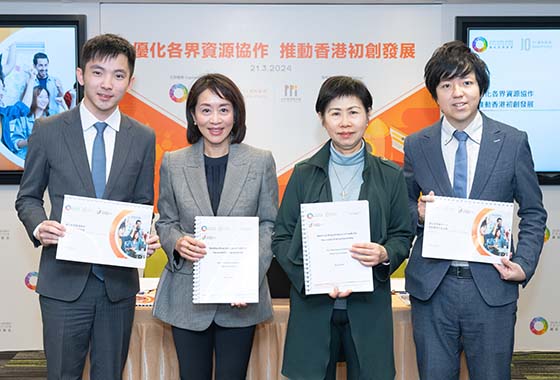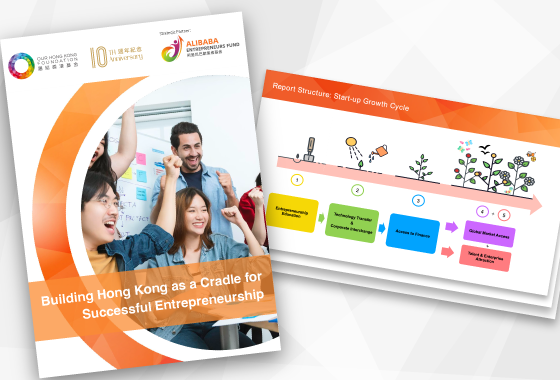Our Hong Kong Foundation and the Ministry of Science and Technology Torch High Technology Industry Development Center jointly publish a Research report on fostering Hong Kong youths’ technology innovation and entrepreneurship in the Mainland
(13 Dec 2022, Hong Kong) A research report on technology innovation is jointly published by Our Hong Kong Foundation (OHKF) and the Ministry of Science and Technology Torch High Technology Industry Development Center (Torch Center), which systematically conveys three key messages to offer Hong Kong youths clearer directions when developing their career in the mainland. The Report also raises seven policy recommendations to provide pertinent support to Hong Kong youths hoping to engage in technology innovation and entrepreneurship in the mainland. The Report entitled ‘Unleashing Hong Kong Youths’ Potentials in Technology Innovation to Build a National Engine for Innovation and Entrepreneurship’ aims at exploring the expansion of the market for Hong Kong’s research outcomes and promoting the commercialisation of such outcomes in the mainland in a bid to constructing the Greater Bay Area (GBA) into an international innovation and technology (I&T) hub.
When considering developing their career in the Mainland, Hong Kong youths often have some questions in mind – given the distinctive features of the different cities’ I&T industries, which city suits my development path the most? Which city offers preferential policies tailored for Hong Kong people? What policies work perfectly for my needs? The Report presents systematic analysis and information in response to the aforementioned questions from an entrepreneur’s perspective. First, by dissecting major Chinese cities’ distinct development directions of the nine strategically important emerging industries (including new-generation information technology, biotechnology, new energy, new materials, high-end equipment, new-energy vehicles, green and environmental protection technology, aeronautics and astronautics and marine equipment). As designated in the 14th Five-Year Plan, the Report allows young people to understand and explore the unique industry strengths and business opportunities in different cities. Next, through a detailed comparison of preferential policies tailored for Hong Kong people offered by GBA cities, the Report helps youths to select the most suitable city to settle. Third, to help youths who already have a target city in mind to better understand its existing policies, the Report details major policies in various GBA cities which are conductive to the entrepreneurship and employment of Hong Kong people.
To formulate the seven policy recommendations, OHKF designed and issued questionnaires via different channels to collect feedback for further analysis. The policy recommendations cover pain points besetting Hong Kong youth: (i) during the preparation stage of entrepreneurship, (ii) their onsite struggles and (iii) living support, so that the Mainland and HKSAR Governments can offer more comprehensive assistance to would-be entrepreneurs in the Mainland.
Preparation stage of entrepreneurship:
Recommendation 1 – integrating platform messages to ease the comprehension of mainland policies and information
The Report suggests that the swift implementation and frequent updates of mainland policies make it hard for Hong Kong youths to keep abreast of policy development. Survey results show that almost 60% of respondents indicated a lack of channels to acquire information to better understand the GBA.
The Report calls for clearer division of work between and build stronger connection among the three existing websites in providing GBA information. To begin with, the Hong Kong Economic and Trade Office in Guangdong (GDETO) can assist the Office of the Guangdong Provincial Leading Group for the Development of the Guangdong-Hong Kong-Macao Greater Bay Area to optimise the GBA portal, particularly turning it into a unified and integrated database to ensure timely updates of policies introduced.
Furthermore, the Report recommends the GBA webpage of the Constitutional and Mainland Affairs Bureau to help extract and share all information relevant to Hong Kong entrepreneurs from the vast trove of information in the portal. The Bureau should also concurrently enhance the analytical function of the webpage.
Thirdly, the Report suggests broadening the functions of GoGBA, a one-stop platform under the Hong Kong Trade Development Council, to offer more practical information to Hong Kong youths hoping to develop their career in the mainland. For instance, a handbook can be jointly published with municipal governments in the Mainland to support settling in GBA cities
Recommendation 2 – facilitating immersion and networking programs offered by universities
Our survey results suggest that around 70% of respondents believe cultural differences and a lack of interpersonal networks in the mainland are matters of grave concern. The Report points out that exposure to mainland cultures and development of social networks during university times is of particular importance to entrepreneurs.
Currently, seven Hong Kong universities (The University of Hong Kong, the Chinese University of Hong Kong, Hong Kong University of Science and Technology, the Hong Kong Polytechnic University, City University of Hong Kong, Hong Kong Baptist University and Hong Kong Metropolitan University), have been offering or planning to offer tertiary programmes in GBA cities. The Report proposes that Guangdong and Hong Kong can collaborate in encouraging universities jointly run by both places to introduce minor or concentration programmes in innovation and entrepreneurship, and allow Hong Kong university students to enrol in their penultimate or final years. Practical exercises play a huge role in entrepreneurial subjects, so the mandatory final year projects, where they can choose between setting up a business, or planning a business by drafting a proposal and pitching their entrepreneur concepts to prospective investors, will equip students with necessary skills.
Onsite struggles:
Recommendation 3 – tackling the dilemma of “unopened big and small doors”
The “unopened big door” refers to the limitations of starting businesses in certain fields in the Mainland. As Hong Kong enterprises are regarded as ‘foreign investors’, they may fail to actualise their aspirations even when entrepreneurial opportunities arise. The Report recommends that relevant departments could consider gradually lifting the investment restrictions imposed by the Negative List on Hong Kong people, subject to prior approval. If the juridical person or major shareholder of an enterprise is a Hong Kong permanent resident of Chinese nationality and the enterprise is registered in the Loop with approval, it can be allowed to put its operation to the test in the GBA first before considering gradual nation-wide expansion depending on its performance during the pilot stage.
The ‘unopened small door’ means that Hong Kong people may not truly benefit from the preferential policies implemented by the central or provincial governments, due to the inability of frontline departments of regional governments to offer clear application guidelines. The Report proposes that regional governments should strengthen their
execution capabilities when implementing new policies so as to familiarise Hong Kong youths with concrete implementation details. For example, the application procedures and supporting documents required should be made clear.
Recommendation 4 – enhancing incubators’ efficacy by advancing subsidies for incubated start-ups
The services of mainland’s existing incubators are rather rudimentary as they mainly provide office space with insufficient long-term and comprehensive measures for start-ups.
The Report urges departments including the science and technology departments and human resources departments of all provinces to encourage large-scale provincial incubators (such as the 1+12 Hong Kong-Macao youth innovation and entrepreneurship incubators in Guangdong Province) to more proactively assist cash-strapped start-ups in their application for subsidies offered by mainland governments, and provide advance subsidies for successful applicants.
Recommendation 5 – bringing together government, businesses and citizens to boost recruitment and employment through job fairs
Start-ups run by Hong Kong people in the Mainland are relatively small in scale with inadequate fringe benefits, which blunts their appeal for mainland employees. This is reflected in the survey results where 60% of respondents found it hard to recruit and retain talents in the Mainland.
The Report suggests that the HKSAR Government’s offices in the Mainland can take the lead and initiative to connect with the education departments and human resources departments of all provinces in the joint organisation of ‘campus recruitment fairs for start-ups’. They mainly help Hong Kong start-ups in the mainland to approach and hire university students, thereby elevating their recruitment success rate. The Report also urges these offices to offer more consultation services on human resources to enterprises run by Hong Kong people, including but not limited to labour law consultation.
Recommendation 6 – introducing a ‘Patent Prosecution Highway’ to optimise patent protection
Patents are valuable assets and resources of many start-ups. The Report points out that it takes longer time for Hong Kong entrepreneurs to apply for patents in the mainland as they have to go through more complicated procedures.
To address this, the Report suggests that the Hong Kong Intellectual Property Department can reference from the collaboration mode between the China National Intellectual Property Administration (CNIPA) and more than 20 other patent departments such as Singapore’s, and seek the establishment of a ‘Patent Prosecution Highway’ (PPH) with the CNIPA to connect the two places. This can expedite approvals and the success rate for Hong Kong applicants to enjoy patent protection in the mainland.
Living support
Recommendation 7 – improving Hong Kong people’s quality of life in the mainland by prioritizing the optimization of education and healthcare provisions
Living support is indispensable when Hong Kong people strive for career development in the Mainland. As such, the Report recommends all the municipal education departments in Guangdong Province to relax or remove the point-based requirements for children of Hong Kong and Macao residents to study in government schools so that they can enjoy the same right to education enjoyed by local students having a hukou, the household registration papers.
Dr Stephen Wong, Senior Vice President and Executive Director of Public Policy Institute of OHKF, stresses that as ‘the whole is greater than the sum of its parts’, by strengthening the collaboration between the Mainland and HKSAR Governments and encouraging Hong Kong youths to start or expand their businesses in the Mainland, complementary and synergistic effects can be achieved through capitalising on the strengths of both places. While Hong Kong excels in basic research with top-notch talents, the Mainland offers a broad platform and unlimited opportunities. Hong Kong youths should seize the golden opportunity to integrate into national development and be the trailblazer in China’s development in technology innovation, fostering such development in the GBA as well as the whole country.
Mr. Kenny Shui, Research Director and Head of Economic Development of OHKF, says that Hong Kong should proactively garner support from the central, provincial and municipal governments in the implementation of pilot reform schemes and seek to overcome existing constraints. This can be exemplified by the ‘unopened door’ where Hong Kong enterprises are still restricted by the negative list applied to foreign investments. While Hong Kong enterprises cannot invest in industries such as stem cells and genetic diagnosis technology in the mainland yet, the vast potentials of the Loop, which serves as the pilot area for policy and institutional innovations, should be unleashed. The Central Government can explore allowing Hong Kong enterprises registered in the Loop with Hong Kong permanent residents of Chinese nationality being the major shareholders to enter the GBA market, subject to prior approval. Should the pilot implementation work well, it can be applied across the whole country.
Full Report website:https://bit.ly/3Pk8eBq
Full live report launch:https://youtu.be/RXsKGfqJ1YM?t=793
_0.jpg)
_0.jpg)
_2.jpg)
_1.jpg)



